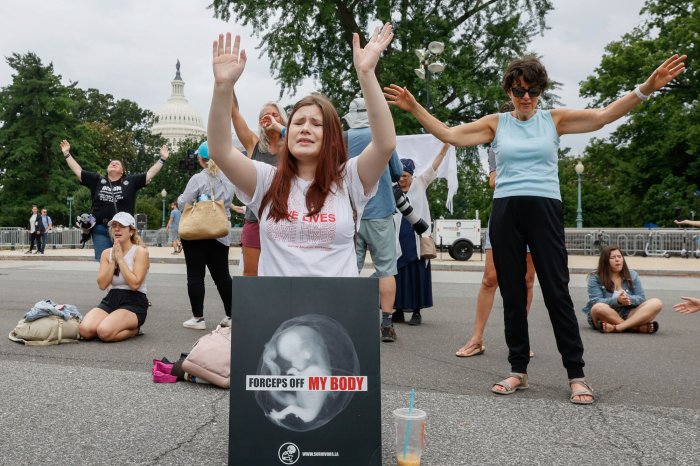A Texas judge on Friday issued an exemption to the state's abortion ban under which doctors would remain free from prosecution if they determined the fetus will not survive after birth. File Photo by Tasos Katopodis/UPI |
License Photo
Aug. 5 (UPI) -- A Texas judge has issued a temporary exemption to the state's abortion ban allowing women with complicated pregnancies to obtain the procedure in some cases.
State District Court Judge Jessica Mangrum of Austin issued the decision on Friday, under which doctors would remain free from prosecution if they determined the fetus will not survive after birth.
Mangrum ruled that the state's attorney general cannot prosecute doctors who, in their "good faith judgment," terminate a complicated pregnancy. Mangrum outlined those conditions as a pregnancy that presents a risk of infection; a fetal condition in which the fetus will not survive after birth; or when the pregnant person has a condition that requires regular, invasive treatment.
In her ruling, Mangrum wrote that Senate Bill 8, the law restricting abortion access, was unconstitutional. She said that enforcement of the abortion ban was beyond the legal powers of Texas officials tasked with prosecuting physicians under this law.
In a statement celebrating the injunction, the legal group representing the plaintiffs, the Center for Reproductive Rights, said that the ruling gives clarity to doctors as to when they can provide abortions, allowing them to use their own medical judgment.
Last month, the court heard from three women who testified against Texas' abortion ban, describing how delayed medical care impacted their pregnancies. The women are suing the state over the law, seeking to clarify when a medical emergency justifies an abortion. Currently, the law allows termination of a pregnancy if the mother's life is in danger.
"Now people don't have to be pregnant and scared in Texas anymore," lead plaintiff Amanda Zurawski said in a statement on Friday. "We're back to relying on doctors and not politicians to help us make the best medical decisions for our bodies and our lives."
The attorney general's office did not return a request for comment Friday evening.
The state is likely to appeal, which could cause the injunction to be blocked while the case makes its way through the courts. The ruling suggests patients with complicated pregnancies can seek abortions in the state without prosecution of those who aid in and perform the procedure.
A trial to determine the issue, clarifying when a medical emergency justifies an abortion, has been scheduled for March 25.
This article originally appeared in The Texas Tribune.
The Texas Tribune is a member-supported, nonpartisan newsroom informing and engaging Texans on state politics and policy. Learn more at texastribune.org.
Faith Adams of Bangor, Maine, kneels in prayer at a praise and worship service outside the U.S. Supreme Court in Washington on June 27, days after the court ruled to overturn the Roe vs. Wade abortion case. Photo by Jemal Countess/UPI |
License Photo
















